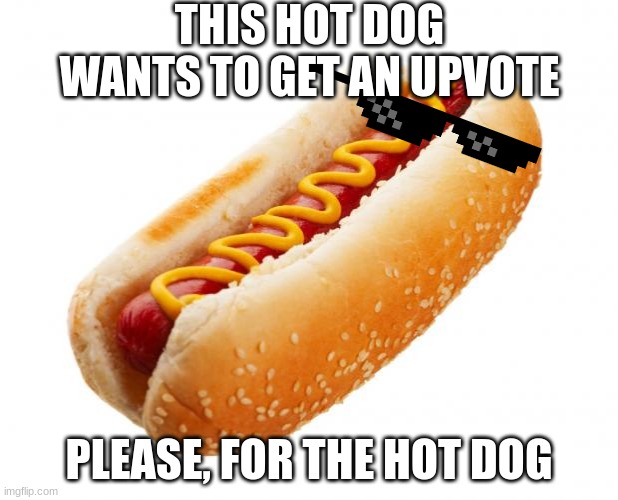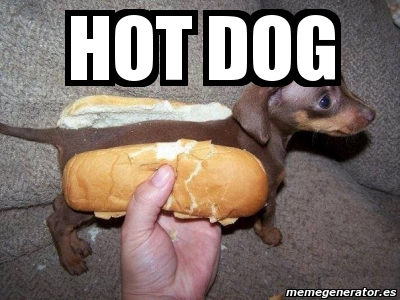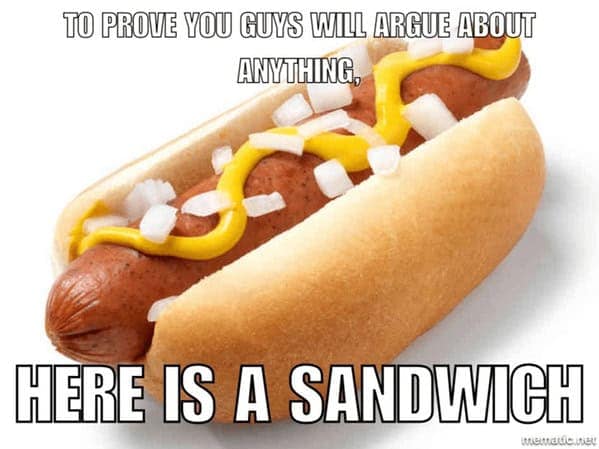Sometimes, the simplest phrases catch on in the most surprising ways. Think about it, a few words, maybe a picture, and suddenly, everyone's sharing it. This is very true for the "Do you want a hot dog meme," a little piece of internet fun that seems to pop up when you least expect it. It's got a certain charm, you know, a directness that makes people smile or just wonder what's going on.
It's fascinating how a straightforward question can become a cultural moment online. This meme, in a way, takes a very everyday offer and turns it into something quite playful and unexpected. It makes you think about how things spread, and just what makes something stick in people's minds. It's a bit like a secret handshake for those who get the joke.
So, we're going to take a closer look at this particular meme. We will, in some respects, explore the word "do" itself, which is a key part of the phrase. We'll consider what "do" actually means in different situations and how that helps shape the meme's appeal. It's really quite interesting how a small word can carry so much weight.
- Brandy Billy Back Porch
- Riley Reid Car
- Wo Xing Shi Lyrics
- Sabrina Carpenter Darwin
- Daisy Melanin Viral Video Original Video
Table of Contents
- What Does "Do" Do in "Do You Want a Hot Dog Meme"?
- How Does the Meme "Do" Its Job?
- Beyond the Bite - What Does This "Do" for Us?
- Does "Do" Always Mean the Same Thing?
- Why Do Simple Questions Stick?
- What Kind of "Do" Is This?
- The Meme's "Do"-ing - Spreading Smiles
What Does "Do" Do in "Do You Want a Hot Dog Meme"?
When you hear "Do you want a hot dog meme," the word "do" kicks off the whole thing. It sets the stage for a question, doesn't it? This particular "do" is a helper word, really, getting the sentence ready to ask something. It's not about someone performing an action themselves, like "I do my homework," but rather it's there to frame an inquiry. It's pretty essential for making the phrase work as an invitation or a query. You know, without it, the sentence wouldn't quite make sense as a question. It's almost like a little signal that something is being asked.
The Question's Core - "Do you want a hot dog meme"
The "do" here is a classic example of an auxiliary verb. It helps to form questions in English, especially in the present simple tense. For instance, if you were to say "She likes hot dogs," and you wanted to ask about it, you'd add "does" at the start: "Does she like hot dogs?" Similarly, for "you want a hot dog meme," the "do" comes right in front to turn it into a question. It's a very common way we structure our questions, and it feels natural to us. It just makes the phrase "do you want a hot dog meme" flow correctly as a query.
This little word "do" makes it possible to ask about someone's desire or preference. It's not a verb that shows a physical action, but rather a grammatical one that helps the main verb, "want," do its job. It's a simple, yet powerful, tool in our language. You could say, it does a lot of work for such a small word. It really helps to shape the whole meaning of "do you want a hot dog meme" as an invitation.
- Sister Brother Share Hotel Room
- Pov Mom And Son
- Tony Lopez Helicopter Video 2019
- Just Gimme My Money Kai Cenat
- Saquon Barkley Meme
How Does the Meme "Do" Its Job?
A meme, just like a person, can be said to "do" things. When we talk about the "do you want a hot dog meme," it definitely performs an act. It brings about a reaction, whether that's a laugh, a puzzled look, or the urge to share it with someone else. The meaning of "do" can be "to bring to pass," and this meme certainly brings humor and connection to pass. It fulfills a role, which is to entertain and spread a bit of internet culture. It's really quite good at what it does.
The Meme's Action - "do you want a hot dog meme"
When you "do" something, you take some action or perform an activity or task. This meme, in its own way, takes action. It appears, it surprises, and it often gets a chuckle. It's not just a static image or phrase; it actively works to get a response from people. This is a bit like how a person might "do" their job, carrying out tasks to achieve a goal. The meme's goal, in this case, is to be shared and to bring a bit of lighthearted fun. It definitely performs its task well, getting people to react to "do you want a hot dog meme."
The meme, by existing and being shared, is performing a kind of duty within the online world. It helps to define certain moments or inside jokes among internet users. It's a very common action for a meme to take, which is to spread and become part of the shared online experience. So, in a very real sense, the "do you want a hot dog meme" does a lot of work just by being itself and making people smile. It truly does its part in the online space.
Beyond the Bite - What Does This "Do" for Us?
The "do you want a hot dog meme" offers more than just a quick laugh. It shows how simple ideas can become widely known. It's a reminder of how human connection, even through something silly, can happen online. The meme, in a way, does a service by creating shared experiences. It's about that moment of recognition, that little spark of understanding that happens when someone sees it and gets the joke. It really does create a sense of belonging for those who are in on it.
A Doctor of Osteopathic Medicine's View on "do you want a hot dog meme"?
Now, this might seem like a bit of a jump, but let's think about how a Doctor of Osteopathic Medicine, or a DO, approaches things. According to the American Osteopathic Association, DOs look at the body as an integrated whole, rather than just treating separate symptoms. This way of thinking, in some respects, can be applied to how we look at the "do you want a hot dog meme." It's not just about the words or the picture alone; it's about the whole package, how it feels, how it spreads, and what it means in context. The meme, too, is an integrated whole, not just isolated parts.
A DO is a fully trained and licensed doctor, doing the same job as an MD. They are complete professionals. Similarly, the "do you want a hot dog meme" is a complete, fully formed piece of internet culture. It does its job effectively, just like a DO does their job effectively in healthcare. It's a whole entity that performs a specific function within its own environment. It really is a complete thought, this "do you want a hot dog meme," in its own funny way.
They both, in their very different fields, perform a role. A DO helps people with their health, focusing on the entire person. The meme, on the other hand, helps to spread humor and connect people, working as a complete unit of fun. It's about understanding the full picture, whether it's a person's health or the way a meme works. The meme, too, has a sort of 'wholeness' to it, making the "do you want a hot dog meme" more than just its simple parts.
Does "Do" Always Mean the Same Thing?
The word "do" is pretty flexible in English, isn't it? It has a few different meanings depending on how it's used. In "do you want a hot dog meme," it's clearly an auxiliary verb, helping to form a question. But "do" can also mean to perform an action, like "I do my chores." Or it can stand for a type of doctor, a DO, as in Doctor of Osteopathic Medicine. It's fascinating how one small word can carry so many different ideas. It's really quite versatile.
Different Meanings of "Do" - "do you want a hot dog meme"
Let's look at some of these meanings. "Do" can mean to bring something to pass, to cause something to happen. For example, "The storm did a lot of damage." In that sense, the "do you want a hot dog meme" does cause a reaction. It makes people laugh or wonder. It also means to perform an act or a duty, like "She does her job well." The meme, in its own way, performs the duty of being funny and shareable. It's more or less a little performer in the digital space.
Then there's the grammatical "do," which is how it's used in our meme. It's one of three auxiliary verbs in English, along with "be" and "have." We use it to make questions, like "Do you like this?" and to make negative sentences, like "I do not like that." It can even be used to make a verb more forceful, as in "I do believe you!" So, when you see "do you want a hot dog meme," you're seeing "do" in its questioning role. It's quite a busy little word, isn't it?
The fact that "do" has these multiple uses means that when we encounter it, our brains quickly figure out which meaning applies. In the context of the meme, it's pretty clear it's about asking a question. But knowing its other uses helps us appreciate how clever and simple the language can be. It's almost like a linguistic chameleon, this word "do," adapting to its surroundings. It truly is a word that does a lot for us.
Why Do Simple Questions Stick?
Why is it that a simple question like "Do you want a hot dog?" can become a meme? Part of it is the directness. It's an invitation, a challenge, or just a random thought that pops up. Simple questions often stick because they are easy to understand and relate to. They don't require a lot of thought or background knowledge. Everyone, more or less, understands what it means to be asked if they want something. It's a very human experience, wanting things.
The Power of a Direct "do you want a hot dog meme"
The directness of "do you want a hot dog meme" is a big part of its charm. It gets straight to the point. There's no beating around the bush. This kind of straightforward communication often works well in the fast-paced world of the internet. People appreciate something that is clear and doesn't demand too much effort to grasp. It's like a quick little mental snack. It just gets in there and makes its point, doesn't it?
This direct approach also makes it easy to share and re-use. You don't need a long explanation for the joke; the question itself is the setup and the punchline, depending on the context. It's a very simple structure that works well for spreading ideas. It's pretty much a perfect fit for how memes spread. The phrase "do you want a hot dog meme" is, in a way, its own little package of fun.
The question form, helped by that little word "do," invites interaction. It's not just a statement; it's something that expects a response, even if that response is just an internal chuckle. This engagement is what helps memes spread and stay relevant. It's a conversational starter, even if the conversation is just happening in your head. It's almost like the meme is talking directly to you, asking "do you want a hot dog meme?"
What Kind of "Do" Is This?
So, we've touched on it, but let's really nail down the type of "do" we're dealing with in "do you want a hot dog meme." It's not the "do" that means to carry out an action, like "I do my laundry." And it's certainly not the "DO" that stands for Doctor of Osteopathic Medicine. This particular "do" is a helper verb, a bit of a quiet worker in the sentence. It's there to make sure the main verb, "want," can ask a question properly. It's truly just a functional part of the sentence structure.
The Auxiliary "Do" in "do you want a hot dog meme"
As we know, "do" is an auxiliary verb. This means it helps other verbs. When we make questions



Detail Author:
- Name : Lennie O'Connell
- Username : glover.lavon
- Email : ywyman@carter.com
- Birthdate : 1998-12-14
- Address : 16445 Reynolds Via Ryanmouth, UT 88084-0208
- Phone : 502.722.1036
- Company : Stokes-Considine
- Job : Marine Engineer
- Bio : Quasi nihil nihil tenetur impedit. Sequi quas ex enim illo voluptatem dolorem nihil maiores. Fugit adipisci et accusamus. Pariatur omnis qui et.
Socials
facebook:
- url : https://facebook.com/kokuneva
- username : kokuneva
- bio : Dolor molestiae natus debitis culpa deleniti.
- followers : 5564
- following : 2374
tiktok:
- url : https://tiktok.com/@kurtis8808
- username : kurtis8808
- bio : Voluptates eum assumenda ut dolorum cum repudiandae.
- followers : 1539
- following : 1510
instagram:
- url : https://instagram.com/kurtis_xx
- username : kurtis_xx
- bio : Et qui dignissimos nam impedit omnis. Et iusto et laboriosam vel.
- followers : 3477
- following : 2481
twitter:
- url : https://twitter.com/okuneva1975
- username : okuneva1975
- bio : Natus ut ex et molestias maiores. Veniam eius omnis aperiam ut accusamus quas accusantium. Aut explicabo autem voluptas expedita quia non.
- followers : 5025
- following : 2962
linkedin:
- url : https://linkedin.com/in/okunevak
- username : okunevak
- bio : Id qui omnis optio aut mollitia animi error.
- followers : 4094
- following : 2581